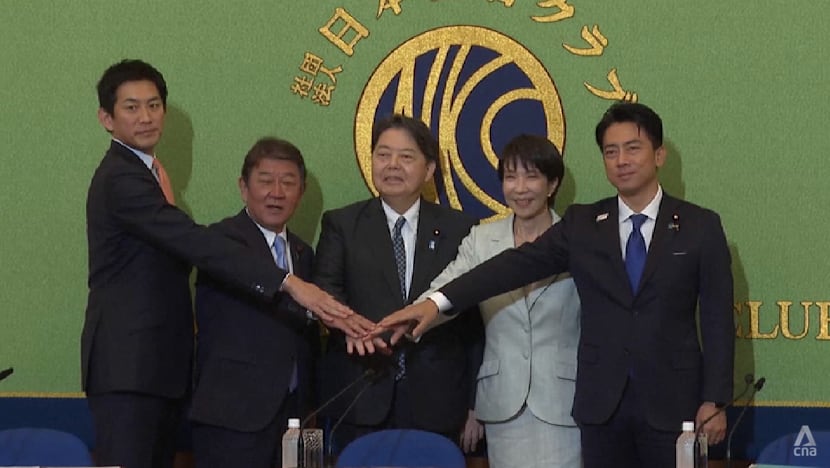Who will lead Japan? Ruling party faces tough questions on living costs, immigration and public trust
Five candidates are vying to succeed Prime Minister Shigeru Ishiba, who is stepping down after a string of electoral defeats.

Five contenders vying to succeed Prime Minister and party president Shigeru Ishiba faced tough questioning on policy issues at a closely watched debate at the Japan National Press Club in Tokyo on Sep 24.

This audio is generated by an AI tool.
TOKYO: Cost of living, immigration, and public trust are among the key issues that have emerged as Japan's ruling Liberal Democratic Party (LDP) prepares to elect a new leader on Saturday (Oct 4).
Five candidates are vying to succeed Prime Minister Shigeru Ishiba, who is stepping down as the party’s president after a string of electoral defeats.
His successor will face the challenge of tackling rising living costs, which analysts say were a major factor behind the party’s loss in the recent Upper House election.
RISING LIVING COSTS
So far, the LDP has resisted calls to cut the consumption tax. It is currently set at 10 per cent, with a reduced rate of 8 per cent for essentials such as groceries.
But that stance could shift depending on who wins, observers said.
“Food is an essential for everyone,” said frontrunner and former economic security minister Sanae Takaichi, who lost to Ishiba in the previous run-off.
“With focus on food, I proposed whether it might be possible to reduce it (consumption tax) to zero.”
However, there are concerns that such a cut could undermine funding for Japan’s social welfare system.
Another contender, Yoshimasa Hayashi, the top government spokesman in Ishiba's Cabinet with extensive ministerial experience, said: “Post-baby boomers will soon join the elderly population. That means (the number of elderly) is on the rise.”
Most candidates rejected an earlier LDP pledge to provide uniform cash handouts.
Instead, they proposed measures to spur real wage growth and curb inflation, such as cutting the petrol tax, lowering social insurance premiums, and implementing income tax breaks.
IMMIGRATION STANCE
Beyond bread-and-butter issues, concerns have also arisen over a growing influx of foreigners.
The number of foreign residents in Japan rose to more than 3.6 million in April — an increase of over 10 per cent from the same period last year, according to official data.
“Worries are spreading about foreigners working illegally, friction with their neighbours and the deterioration of public safety,” said Agriculture Minister Shinjiro Koizumi, who is among the top favourites to succeed Ishiba.
“There are issues of overtourism and foreigners purchasing massive real estate, which we hear about,” he added. “I will handle it one by one and resolve it.”
The candidates — most of whom identify as moderate conservatives — will face scrutiny over their views on immigration.
This comes especially after the opposition Sanseito party gained ground in the Upper House polls on an anti-immigrant stance.
EXPANDING THE COALITION
Even more pressing, however, is how candidates show their ability to win back public trust, after voter backlash over scandals related to LDP's mishandling of political funds that surfaced in 2022.
Some observers argued that they have yet to do enough on this front.
“The (administration of former prime minister Fumio Kishida) enforced penalties. Then right after the Ishiba administration started, the Lower House was dissolved,” said candidate and former economic security minister Takayuki Kobayashi.
“There were more (LDP lawmakers) penalised by not being endorsed as candidates. In the Lower House and Upper House elections, the public gave their verdict.”
Having lost its majority in both chambers of parliament, the LDP will need opposition support to pass policies.
Analysts said how the candidates intend to work with opposition parties has been a key focus of the campaign.
One possibility floated is expanding the current LDP–Komeito coalition by partnering with the Japan Innovation Party or Democratic Party For the People.
There are precedents for the LDP working with the opposition in its 70-year history.
Before allying with Komeito in 1999, it partnered with its then-main rival, the Socialist Party, to form a coalition government in 1994.
Observers said expanding the coalition now would signal to the public that the LDP is serious about internal reform.
“The procedure is this - we need to prioritise policies, then agree on those policies,” said candidate and former top diplomat Toshimitsu Motegi, known for being a tough trade negotiator.
“It can be cooperation outside our Cabinet or as a coalition.”


















